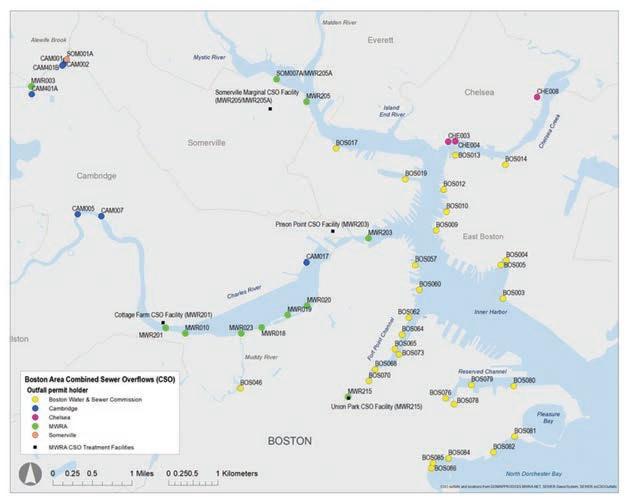
7 minute read
Want to Know if Raw Sewage Gets Dumped in Your Local River? There’s a Bill on Baker’s Desk About It
A MWRA wet weather sewage discharge outfall warning on the Charles River by the outlet of Boston's Muddy River (Robin Lubbock/WBUR)
Among the many bills sitting on Governor Baker’s desk (Editors note: When this magazine went to print.) is one requiring cities and towns to notify residents any time raw sewage ends up in a local river or water body. As gross and alarming as it sounds, sewage dumps actually happen hundreds of times every year in Massachusetts during heavy rain, because of antiquated sewer systems. They release hundreds of millions of gallons of bacteria-laden waste into waterways like the Charles, Mystic, and Merrimack Rivers, and Boston Harbor, and the problem is expected to worsen as climate change brings heavier and more frequent rainstorms to the region.
The bill, if enacted, would require wastewater operators to send out email or text notifications to local and downstream residents within two hours of discovering a sewage discharge, and updates every eight hours for as long as the problem persists. They will also have to publish information online about how much sewage-laden water was released and put up signage near problem areas.
First introduced in 2013, a bill establishing the notification system has been kicking around Beacon Hill for three legislative sessions. Recently, both the House and Senate voted overwhelmingly to pass it, a first for this bill and it was delivered to Governor Baker, who now has 10 days to decide whether to sign it.
If enacted, this notification system will represent a “public health victory for Massachusetts residents” because it will allow people “to make informed decisions on recreation and their own health,” says Patrick Herron, Executive Director of the Mystic River Watershed Association.
Emily Norton, Executive Director of the Charles River Watershed Association, agrees.
“This bill is really important because people use our rivers. They certainly use the Charles River for boating and recreation, sometimes dogs go into them,” Norton says. “People have the right to know if they’re putting their health at risk.”
She adds that the need for this bill is especially acute because we know the coronavirus has been detected in wastewater. “If that’s in our rivers, people have a right to know.”
Full data about sewage discharges during 2020 is not yet available, but recent data from the Massachusetts Water Resources Authority shows that on Christmas Day, at least 29 million gallons of sewage water was discharged into Boston Harbor, the Mystic River, and the Fort Point Channel during a rainstorm that dropped 1.49 inches of water.
In 2018, a particularly bad year for sewage discontinued on page 53
Want to Know? continued from page 51 charges, 770 million gallons of dirty water was released into the Merrimack River.
If you’re wondering how on earth we could still be dumping sewage into rivers here in Massachusetts, the answer is something called a CSO, or “combined sewer overflow.”
In modern sewer systems, wastewater from our sinks and toilets flows through one pipe, while stormwater from the streets flows through another. The wastewater goes to a treatment plant like Deer Island, and the stormwater is released into a river, stream, harbor, or other body of water.
But some older systems are “combined,” meaning that wastewater and stormwater travel in the same pipe. Most days, this works just fine, and everything goes to the treatment plant. But in a big rainstorm, the volume of water exceeds pipe capacity and overwhelms the sewer system. Rather than let sewage back up into your house or the streets, a CSO system is designed to discharge into nearby water.
Combined sewer systems are a vestige of 19th century urban planning, and those existing today are mostly in older urban areas like Boston, Cambridge, Springfield, Lowell, Haverhill, and New Bedford. These days, no one builds CSOs anymore. But they still exist because they’re expensive to undo. (For more on the history of CSOs and how they affect public water bodies in continued on page 55

Want to Know? continued from page 53 Massachusetts, read this story we published in 2019.)
Since we’re stuck with them for the time being, and since climate change is going to make the overflow problem worse by causing more sudden, heavy rainstorms that overwhelm the system, environmental groups and public health advocates say that a public notification system is the least we can do.
“We’re just asking that the public be notified when there’s raw sewage in the river — it’s such a no brainer,” says Julia Blatt, Executive Director of the Massachusetts Rivers Alliance, which advocated hard for this bill. “Who could be against it? It’s a public health hazard to be recreating in sewage.”
But some say it’s not so easy. One example: Phil Guerin, Director of Worcester’s sewer system and President of the Massachusetts Coalition for Water Resources Stewardship, a group representing the municipal water sector.
“The actual notification part, sending an email or making a phone call, is not the problem. It’s knowing whether you’ve had a CSO [event] that is the challenge,” he told WBUR in 2019.
Some outfall pipes have real-time monitoring and sophisticated metering systems to measure discharge, and for those systems, a two-hour notification process shouldn’t be a problem, Guerin said. But other systems are more antiquated.
Reached for comment on Wednesday, Guerin said he hadn’t read the full text of the bill on Baker’s desk, but he’s still worried that if passed, it will “put a significant burden on sewer departments and districts,” many of which already face financial challenges.
“Hopefully, as the public receives these notifications on a frequent basis and grows increasingly alarmed and upset, our state and federal legislators will come up with the hundreds of millions of dollars needed to actually fix the problems with antiquated sewer systems,” he adds. “I’m not overly confident that will happen.”
Katharine Lange, Policy Director at the Massachusetts Rivers Alliance, thinks that some of these concerns are overblown. In the last legislative session, the bill was amended to allow wastewater operators to model overflows in outfalls that are hard to monitor in real-time, she says. Also, sewer operators know the capacity of the system, and many overflows happen in predictable ways, she says.
“The benefits of people knowing [about CSOs] are just enormous,” Lange says. “So there’s really not a great argument not to have this in place for public safety — especially in a year when, as we’ve seen, people are turning to their local open space and the local water bodies in record numbers.”
Written by Miriam Wasser. Reprinted from wbur. org. n





Ferguson offers a complete line of products to cover all your water, sewer and storm water management needs, and our relationships with the waterworks industry’s top vendors give our customers peace of mind through unmatched customer service, on-time delivery, and industry leading fi ll rates.




FERGUSON.COM
DI PIPE & FITTINGS | PVC PIPE & FITTINGS | VALVES & HYDRANTS HDPE PIPE & FITTINGS | GEOTEXTILES | BRASS CASTINGS | STORM WATER CHAMBERS | SAFETY & TOOLS WATER MAIN TAPS | HYDROSTATIC TESTING | HYDRANT REPAIR

Canton
(781) 828-1350
North Harwich
(508) 430-1696
©2014 Ferguson Enterprises, Inc.
Worcester (508) 754- 2027
555 Constitution Drive • Taunton, MA 02780
51 Industrial Park Road • Saco, ME 04072 Dennis K. Burke is proud to stock a full line of lubricants, DEF and supplies – everything you need to keep your fleet, facility or shop running at peak efficiency.


We offer full lines from BioBlend, Castrol, Citgo, Kendall, Phillips 66, Petro-Canada, Peak and our own Fleetline brand. Products are available in the quantities you need, when you need them, throughout the New England region. From packaged goods to bulk tank setups – no job is too big, no job is too small.
1-800-BUY-BURKE 1-800-289-2875 www.burkeoil.com

Custom and Standard Concrete Products... Our Specialty!
United Concrete Products, Inc.
173 Church St. Yalesville, CT 06492
www.unitedconcrete.com
Offering a full range of products: Manholes, Catch Basins, Septic Tanks, Leaching Chambers, Dry Wells, Distribution Boxes, Pump Chambers, Grease Traps, PreTreatment Tanks, Utility Vaults, Meter Pits, Yard Drains, Box Culverts, End-Walls, Wing Walls, Curbs, Water Quality Structures, Prefab. Pump Stations, Storage Buildings, Dugouts, Concrete Barriers, Cable Concrete, Retaining Walls, Restroom Buildings, Telecommunication Shelters, Prestress Bridges, National Grid, Traffic Control Structures and many more.

Toll Free: (800) 234-3119 Fax: (203) 265-4941
Jason Lindsey
jlindsey@unitedconcrete.com Cell 203-464-7667 See our full line of products at: www.unitedconcrete.com











